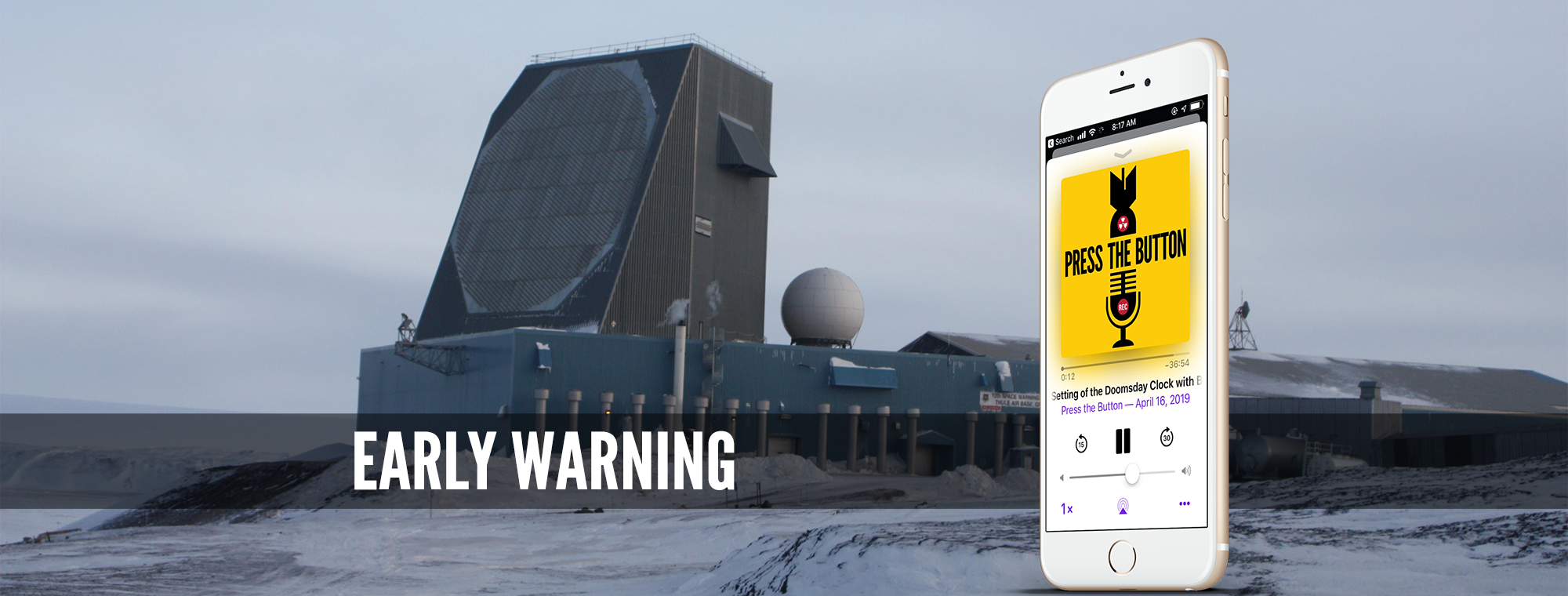This is a transcript of a recent Early Warning segment from the podcast Press the Button, in which Michelle Dover, Joe Cirincione, and Tom Collina discuss the anniversary of the first Soviet nuclear weapons test, crucial nuclear policy-related provisions in the National Defense Authorization Act (NDAA), and a new escalation in tensions between Iran and Israel. Listen and subscribe to our weekly podcast today!
Early Warning segment, August 29, 2019
- Michelle Dover, Director of Programs, Ploughshares Fund
- Joe Cirincione, President of Ploughshares Fund
- Tom Collina, Director of Policy at Ploughshares Fund
MICHELLE: Welcome back to Early Warning. I'm your host, Michelle Dover, Director of Programs here at Ploughshares Fund. And today I am joined by Joe Cirincione, President and also co-host of the podcast with me. And Tom Collina, Director of Policy here at Ploughshares. Gentlemen, welcome.
JOE: Thank you, Michelle.
MICHELLE: It’s a beautiful, beautiful morning in Washington, but we're going to talk about some heavy stuff. So let's get started. Joe – August 29th it's known as the international day against nuclear tests because it's the anniversary of Kazakhstan's decision to close the nuclear testing site in 1991. However, it is also the anniversary of the Soviet Union's first nuclear weapons test, which the US called Joe-1 on that very same site. So, Joe, typically we focus on how August 29, 1991 was the end of an arms race. But which anniversary is more striking to you today?
JOE: To me, we have to celebrate the grim anniversary of the beginning of the nuclear arms race. I mean, that's when it really started. That's when the Soviets tested their first atomic bomb. It was a surprise to US officials, it was a surprise to the world. We thought we were going to be able to maintain an American monopoly for decades. We did not, and that's when we were really off to the races. The first time that that the American public started to fear what the Soviets, who had been our allies, could do to us. President Truman reacting to this publicly embraced more arms control, the Democratic-led Senate embraced more arms control, the UN was talking about arms control but, privately, Truman accelerated the nuclear bomb program. We then had about 200 atomic bombs. He ordered more to be built. More ominously, he started the H-bomb program. This is the fusion bomb, the weapons we now have. Many, many, many times more powerful than the Hiroshima/Nagasaki blasts. Again, we couldn't maintain a monopoly on this. By the early fifties both the US and Soviets were deploying these weapons that American scientist had called “genocidal”. They had no military purpose. They would kill hundreds of thousand civilians, but we started deploying them in the thousands. All that began August 29th, 1949 and we're still living with this legacy today.
MICHELLE: Well, and bringing that arms race to the present day, Tom, before the House and Senate left for the August recess they passed their respective versions of this year's defense spending bill the NDAA. A conference committee will now convene to reconcile the bills into a final version. What are the provisions that the nuclear policy community will be watching most closely?
TOM: Thanks Michelle. I want to point to a letter that came out just earlier this month from 18 senators, Democrats, who are looking to support some of the key provisions that the House passed, under the leadership of Adam Smith in the House Armed Services Committee, that are not in the Senate bill. And those 18 democrats include four presidential candidates. So these are going to be high profile issues going forward. And the issues that they focused on, that are in the House bill: 1) is President Trump's requests for a new low yield nuclear weapon. They see this weapon is very dangerous, very destabilizing, more usable and, in the hands of President Trump, very concerning. 2) They also support the extension of arms control. So, for example, the New START treaty that expires in about 18 months that the administration has so far said they do not expect to extend. And on the INF treaty, which President Trump just withdrew from 3) the Pentagon is now developing weapons that would previously have been prohibited by INF. So those three issues we're tracking very closely. Senate Democrats are working with their leadership to try to get them to match the very good language that the House passed.
MICHELLE: That's great. Was there anything else related to Iran or North Korea in there that we'll be watching?
TOM: Two other things we'll be watching for: 1) the House passed language to prohibit President Trump from launching an unauthorized war with Iran. So we'll be watching that. And, 2), the House also passed a good-sense-of-Congress language promoting diplomacy with North Korea and trying to seek an end of the war on the Korean Peninsula.
MICHELLE: Well, thanks for the preview. Something we'll pay close attention to this September.
TOM: Any time.
MICHELLE: Meanwhile, Joe, speaking of Iran – Israeli forces openly claimed attacks over the weekend in Syria and as well, unofficially or somewhat officially took responsibility for operations in Lebanon and Iraq, all of which targeted Iranian assets or allies. This appears to represent a new escalation in what the New York Times calls “The Shadow War” between Iran and Israel. Why the escalation and how will this affect the current tensions in the Middle East?
JOE: Israel is really pushing the envelope here and there's a reason why leading American papers are warning against it, even those who strongly support Israel. It's because they're doing something that's never happened before. Remember, our US ally, Israel, is now bombing our US ally, Iraq, openly claiming credit for it. We think it was a drone blast in Iraq, they killed the leader of an Iranian-backed Iraqi militia group. So it's an Iraqi militia, but Iranian-backed. So you’re coming real close to killing Iranians and we may be already doing that with the Israeli attacks in Syria, which are killing, again, Iranian-backed commandos. And over in Lebanon they just bombed a site not far from Hezbollah's office. So they're really raising the stakes here. Fortunately, in the rest of this podcast we get to hear from Barbara Slavin who's been tracking this very closely and she unpacks it a bit for us the way Rob Malley did a couple of episodes ago, they both warn that the Middle East is a tinderbox, and Israel in the United States with throwing matches.
MICHELLE: So we still have a little bit of time left since you guys were so efficient. I want to pull on this thread a little more. The US is now in a situation, as you laid out, where one ally is bombing another ally. They’re trying to figure out with Iran how to resolve this nuclear issue. Are these linked? Are we going to see an effect between them?
JOE: You might say in both, they're both linked in this sort of inaction of the United States administration. The US is absent. What do we have, Jared’s "peace plan"? Is that what we're waiting for to solve this? The US is standing by the side. They should be putting the brakes on Netanyahu. Instead, they’re giving him a green light.
MICHELLE: Well, and with that, thank you both for joining us.
JOE: Thank you, Michelle, my pleasure.
TOM: Thank you.
Listen to the whole episode:
Learn more about our podcast, Press the Button.




